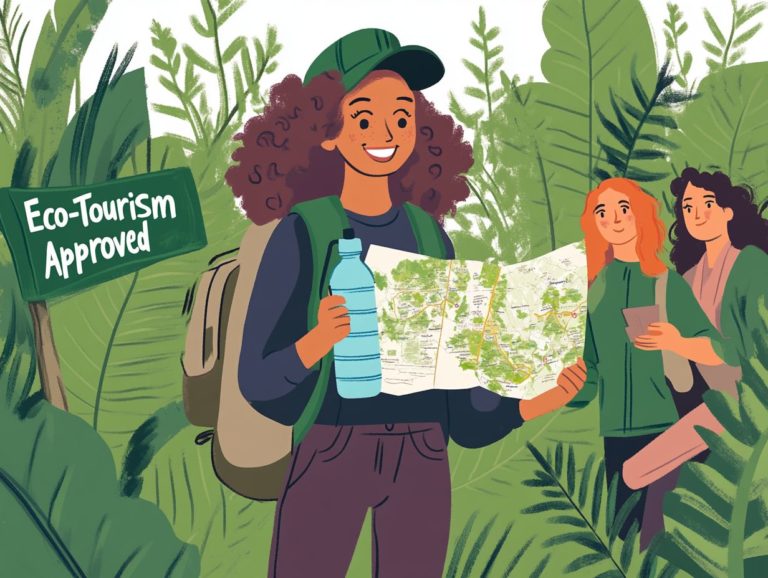What Are Eco-Friendly Travel Trends?
Traveling offers an incredible opportunity to explore the world. However, it often carries a significant environmental cost. As you become more aware of your impact, it’s clear that eco-friendly travel is not just a trend it’s essential.
This article delves into the importance of sustainable tourism, guiding you through its environmental effects. It also introduces you to eco-conscious accommodations and transportation options. You’ll discover straightforward ways to weave eco-friendly practices into your journeys, showing how these practices help the planet and local communities. This guide also emphasizes travel sustainability, ensuring that your adventures align with environmental and social goals.
Take charge of your travels and make a positive difference!
Contents
- Key Takeaways:
- The Importance of Eco-Friendly Travel and Sustainable Travel
- Current Eco-Friendly Travel Trends
- Benefits of Eco-Friendly Travel
- How to Incorporate Eco-Friendly Travel into Your Trips
- Frequently Asked Questions
- What are eco-friendly travel trends?
- Why are eco-friendly travel trends important?
- What are some examples of eco-friendly travel trends?
- How can I incorporate eco-friendly travel trends into my trips?
- How do eco-friendly travel trends benefit the environment?
- Are there any drawbacks to eco-friendly travel trends?
Key Takeaways:

- Eco-friendly travel helps reduce the environmental impact of tourism.
- Look for sustainable accommodations and green transport options.
- These practices benefit both the environment and local communities.
The Importance of Eco-Friendly Travel and Sustainable Travel
Did you know your travels can harm the planet? In a time when the climate crisis looms larger than ever, eco-friendly travel is more important than ever. Travelers are increasingly mindful of their carbon footprints and the environmental consequences of their journeys. Many engage in carbon offsetting, compensating for carbon emissions by investing in environmental projects.
Embracing sustainable travel practices like community-based tourism, which benefits local communities, and ethical wildlife-watching is essential for fostering biodiversity conservation and preserving cultural heritage. As you explore a world brimming with natural marvels, your choices matter. From selecting eco-friendly accommodations to opting for slow travel, each decision can profoundly impact efforts to mitigate the ongoing biodiversity crisis.
Understanding the Impact of Tourism on the Environment
Tourism leaves a significant mark on the environment. It contributes to a noticeable increase in carbon footprints and intensifies the climate crisis.
This surge in travel doesn t just strain local ecosystems; it also leads to habitat degradation, putting the delicate balance of wildlife populations at risk. Activities like safari tours, whale-watching excursions, and visits to natural parks can disrupt animal behavior and create stress for countless species. The infrastructure needed to support tourism often encroaches on crucial habitats, resulting in fragmentation and a loss of biodiversity.
However, if you adopt sustainable practices like participating in eco-friendly tours or selecting accommodations that prioritize conservation, you can significantly mitigate the negative impacts of tourism. By prioritizing responsible travel, you play a vital role in protecting wildlife and preserving our planet for generations to come. To learn more about the advantages of this approach, check out the benefits of eco-conscious travel.
Current Eco-Friendly Travel Trends
The landscape of travel is undergoing a transformation. Contemporary eco-friendly trends are redefining your exploration of the world in a sustainable manner. You may find yourself drawn to eco-conscious accommodations, green transportation options, and community-focused tourism initiatives that emphasize environmental stewardship and cultural authenticity.
As the desire for slow travel rises, so too does the awareness of your shared responsibility. It’s important to minimize your impact on the planet while fully appreciating its natural beauty through various green initiatives.
Ready to explore sustainably? Start planning your eco-friendly adventure today!
Sustainable Accommodation Options

Sustainable accommodation options are on the rise as you seek eco-friendly places to stay, all while minimizing your environmental impact.
You might find yourself increasingly drawn to alternatives like eco-lodges that blend harmoniously into their natural surroundings. Green hotels also prioritize sustainable practices in their operations.
By opting for these accommodations, you reduce the amount of harmful gases we produce and contribute to the preservation of local ecosystems and the well-being of nearby communities.
Many of these places are crafted with sustainable materials and often feature energy-efficient systems, highlighting a strong commitment to taking care of our environment. When considering your options, it’s helpful to know what to look for in eco-friendly tours. Staying in homes with carbon labels allows you to dive into local cultures while supporting eco-friendly initiatives!
Green Transportation Methods
Green transportation methods are vital for anyone committed to sustainable travel. They provide a refreshing alternative to traditional carbon-heavy options, such as rail travel and electric vehicles.
These eco-friendly choices greatly minimize your environmental impact while encouraging a healthier lifestyle. For instance, rail travel uses energy-efficient systems that can transport many passengers using far less energy per person than cars or planes.
Biking offers an exciting way to explore urban areas, all while leaving absolutely no carbon footprint. This makes it a prime choice for responsible travel.
Electric vehicles have also become an excellent option for reducing greenhouse gas emissions, especially with charging infrastructure expanding rapidly. By embracing these methods now, you play a crucial role in creating a cleaner planet for future generations!
Responsible Tourism Practices
Responsible tourism practices are essential if you want to engage with the world in a meaningful way. Championing ethical wildlife-watching and community-based tourism is supported by organizations like the EUROPARC Federation.
By prioritizing cultural preservation and embracing eco-friendly initiatives, you can leave a lasting, positive impact on the destinations you visit. Engaging respectfully with local communities fosters mutual understanding and supports traditional lifestyles.
To put these principles into action, consider the following:
- Choose locally-owned accommodations.
- Participate in guided tours that respect wildlife habitats.
- Engage in volunteer activities that benefit the environment.
By making these conscious choices, you ensure that your adventures enhance rather than exploit the beauty and diversity of the places you explore. Ultimately, this contributes to a more sustainable future for global tourism and supports companies like Much Better Adventures and Intrepid Travel. To learn more about responsible travel options, check out what is eco-friendly travel?
Benefits of Eco-Friendly Travel
Eco-friendly travel presents a multitude of advantages. It allows you to minimize your environmental footprint while simultaneously fostering community engagement and promoting cultural preservation, enhancing your connection with local communities.
Embracing this approach not only contributes to the well-being of the planet but also enriches your travel experience in meaningful ways.
Environmental and Social Benefits

The environmental benefits of eco-friendly travel come hand-in-hand with social advantages, such as fostering wildlife tourism and supporting community-based initiatives, particularly in areas like Wildlife Heritage Areas and Whale Heritage Sites.
These strategies help cut your carbon footprint and create real jobs for local residents, driving economic growth in often overlooked areas. When you engage in eco-friendly practices, this uplifts communities and encourages the preservation of traditional crafts and cultural heritage.
By choosing sustainable destinations, you play a vital role in protecting natural habitats and wildlife, all while enriching your travel experiences through genuine cultural interactions. In this way, eco-conscious tourism connects environmental care with community support, effectively addressing both ecological and social challenges at once. To learn more about how to travel responsibly, explore what sustainable travel practices are.
How to Incorporate Eco-Friendly Travel into Your Trips
Incorporating eco-friendly travel into your journeys is entirely within reach. By making a few simple adjustments, you can promote sustainability and significantly reduce your carbon footprint.
Simple Changes to Make a Difference
Making simple changes in your travel habits can have a remarkable impact on your carbon footprint and promote sustainable practices.
By prioritizing eco-friendly decisions, you can embrace a more responsible way of exploring the world. Choosing reusable water bottles and bags helps minimize waste, while opting for locally-owned accommodations and eateries not only supports the local economy but also reduces transportation emissions. To learn more about the importance of this approach, check out why eco-friendly travel should be a priority.
Be mindful of how far you travel and selecting public transportation or biking whenever possible can significantly lessen your environmental impact.
Join local communities through eco-tours or volunteering for a richer experience, allowing you to connect deeply with the culture while ensuring that your travels contribute positively to the places you visit.
Frequently Asked Questions
What are eco-friendly travel trends?

Eco-friendly travel trends refer to the rising popularity of sustainable and environmentally responsible travel practices. These include reducing carbon emissions, supporting local communities, and preserving natural resources.
Why are eco-friendly travel trends important?
Eco-friendly travel trends are important because they promote responsible and ethical tourism, which helps protect the environment and benefit local communities, particularly in the context of the climate crisis. They also help to preserve natural and cultural heritage for future generations to enjoy.
What are some examples of eco-friendly travel trends?
Some examples of eco-friendly travel trends include using public transportation, staying in eco-friendly accommodations endorsed by organizations like Much Better Adventures and Intrepid Travel, supporting local businesses, participating in conservation activities, and reducing single-use plastic.
How can I incorporate eco-friendly travel trends into my trips?
You can incorporate eco-friendly travel trends into your trips by researching sustainable travel options, including rail travel and slow travel, choosing eco-friendly accommodations, packing reusable items, supporting local businesses, and being mindful of your environmental impact.
How do eco-friendly travel trends benefit the environment?
Eco-friendly travel trends benefit the environment by reducing carbon emissions, conserving natural resources, and promoting environmental conservation efforts, including wildlife tourism initiatives. This helps to preserve biodiversity and protect fragile ecosystems.
Are there any drawbacks to eco-friendly travel trends?
Thinking about eco-friendly travel? While it has fantastic benefits, there are some challenges to keep in mind!
Eco-friendly travel trends can have drawbacks. Options for sustainable accommodations and activities may be limited or cost more.
Despite this, the positive effects on the environment and local communities are significant. They promote ethical wildlife watching and help preserve cultures.






